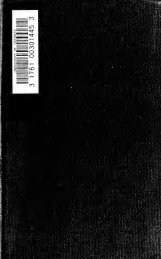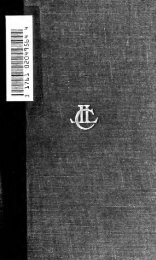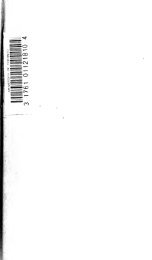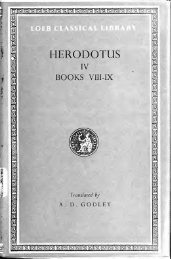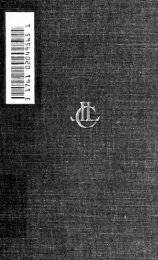- Page 5: THE LOEB CLASSICAL LIBRARYEDITED BY
- Page 8 and 9: finPrinted in Great Britain
- Page 11 and 12: INTRODUCTIONSprung from the rich an
- Page 13 and 14: —INTRODUCTIONin retirement. Three
- Page 15: INTRODUCTIONAmbrosian manuscript ii
- Page 19 and 20: :SELECT BIBLIOGRAPHYEditions and Tr
- Page 21 and 22: VOL. ISENECAMORAL ESSAYS
- Page 23 and 24: THE DIALOGUES OFLUCIUS ANNAEUS SENE
- Page 25 and 26: ON PROVIDENCE, i. 2-4on unhindered,
- Page 27 and 28: ON PROVIDENCE, i. 4-ii. 1tionately
- Page 29 and 30: -ON PROVIDENCE, n. 1-6maintains its
- Page 31 and 32: ON PROVIDENCE, it. 6-10men God has
- Page 33 and 34: —ON PROVIDENCE, ii. lO-iii. i" al
- Page 35 and 36: —ON PROVIDENCE, iii. 1-2the thing
- Page 38 and 39: SENECA6 Infelix est Mucius, quod de
- Page 40 and 41: SENECAsenatorum capita et passim va
- Page 42 and 43: !SENECA11 quae patitur vexat causa
- Page 44 and 45: ;SENECApostferatur. Grave est civil
- Page 46 and 47: ;SENECAmilites bello. Triumphum ego
- Page 48 and 49: ;SENECAtorpescunt, quos velut in ma
- Page 50 and 51: SENECAvindicaverunt, cuius pedes in
- Page 52 and 53: ;SENECAferendo mari dura, agricolis
- Page 54 and 55: SENECAversari et aequo animo ferre
- Page 56 and 57: SENECAotium suum oblectet aut in po
- Page 58 and 59: SENECApublica longus ordo rerum tra
- Page 60 and 61: SENECAoportet ac deorsum eat, fluct
- Page 62 and 63: ;SENECAab illis removit, seelera et
- Page 64 and 65: 'SENECAmulta incidunt tristia, horr
- Page 66 and 67:
SENECA8 si homo tarn tarde moreretu
- Page 68 and 69:
LIBER IIAD SERENVMNEC INIVRIAM NEC
- Page 70 and 71:
jSENECAabscisa et conexa videri sol
- Page 72 and 73:
SENECAmonstra igne ac ferro persecu
- Page 74 and 75:
SENECAparum sana verba emittere et
- Page 76 and 77:
SENECAlacessitur, cum dubiae sint v
- Page 78 and 79:
SENECAve in altum exprimuntur, cum
- Page 80 and 81:
SENECAvexemur more puerorum, quibus
- Page 82 and 83:
;,SENECAperdet quod perire sensurus
- Page 84 and 85:
SENECAgladios et militarem in rapin
- Page 86 and 87:
SENECA6 Teneo, habeo quicquid mei h
- Page 88 and 89:
;SENECAhumani ingenii vanum decus n
- Page 90 and 91:
:SENECAerit, quamvis ilia adultera
- Page 92 and 93:
muneris, et malus nihilpotest dignu
- Page 94 and 95:
SENECAhominum potentium quos scit f
- Page 96 and 97:
SENECAiniuria, et movet et impellit
- Page 98 and 99:
:SENECAEst minor iniuria, quam quer
- Page 100 and 101:
;SENECAliberorumque amissio et patr
- Page 102 and 103:
SENECAQuare ? Quia qui facit contem
- Page 104 and 105:
SENECAforoque et in curia serio lud
- Page 106 and 107:
SENECAomnis hos, qui togati purpura
- Page 108 and 109:
SENECAcontigit, sed hostes teterrim
- Page 110 and 111:
SENECAcogitans et in pontibus quibu
- Page 112 and 113:
SENECAnumero vel magnitudine crever
- Page 114 and 115:
SENECA1 16. Quodsi Epicurus quoque,
- Page 116 and 117:
;SENECAquid dictum ridemus, coram p
- Page 118 and 119:
SENECAdedidicerat, cur isnon possit
- Page 120 and 121:
SENECAnon dico amico, sed tantum ma
- Page 122 and 123:
SENECAnumquam in uno homine etin un
- Page 124 and 125:
SENECAremedio utetur sapiens afFect
- Page 126 and 127:
LIBER IIIAD NOVATVMDE IRALIBER I1 1
- Page 128 and 129:
':SENECAvultus, tristis frons, torv
- Page 130 and 131:
SENECAconcitatio, quae nihil moveat
- Page 132 and 133:
SENECA4 tamquam aut curam nostram d
- Page 134 and 135:
SENECA3 telis finitio non niultum a
- Page 136 and 137:
SENECAregium est illud et principal
- Page 138 and 139:
;SENECAdictorumque amaritudinem efi
- Page 140 and 141:
SENECAnon enim nocet sed medetur sp
- Page 142 and 143:
SENECA4 perire etiam pereuntis inte
- Page 144 and 145:
;SENECAmodum cogere, id vero retine
- Page 146 and 147:
SENECAque illi aliquod voluntate no
- Page 148 and 149:
;ISENECAQuando ? Cum iam ira evanes
- Page 150 and 151:
SENECAindomitamque intellego ; si n
- Page 152 and 153:
SENECA4 " Ita," inquit, " utilis ad
- Page 154 and 155:
SENECA4 perpetuum caeli rigorem ? H
- Page 156 and 157:
jSENECA8 ferro ipsi suo caderent. N
- Page 158 and 159:
SENECAbene praebetur, si vitreum fr
- Page 160 and 161:
iSENECAnemo dicet meliorem futuram,
- Page 162 and 163:
;'SENECAmelior quisque, hoc iracund
- Page 164 and 165:
SENECAest, cur oderim eum, cui turn
- Page 166 and 167:
;SENECAcontineberis.^ Tibi fortius
- Page 168 and 169:
SENECAnee infestus sed vultu legis
- Page 170 and 171:
SENECAitaque suspiciones quasdam et
- Page 172 and 173:
SENECAnova genera poenarum versaver
- Page 174 and 175:
SENECAsi ingeritur oculis Veritas,
- Page 176 and 177:
SENECAnationis commilitoni fuisti ;
- Page 178 and 179:
,SENECArevertitur ? Tenentur itaque
- Page 180 and 181:
: "SENECAtractandam, potestatem vit
- Page 182 and 183:
;SENECAoptaverit, ut odio esset, an
- Page 184 and 185:
!—SENECAquidem sine missione, Hom
- Page 186 and 187:
LIBER IVAD NOVATVMDE IRA1 1. Primus
- Page 188 and 189:
SENECA4 moveatur quaerimus. Nobis p
- Page 190 and 191:
SENECAtacula et lectiones rerum vet
- Page 192 and 193:
'SENECA2 et liunc fortuitum motum p
- Page 194 and 195:
SENECA1 4. Et ut scias quemadmodum
- Page 196 and 197:
SENECAfrequenti exercitatione et sa
- Page 198 and 199:
SENECA2 Nee umquam eommittet virtus
- Page 200 and 201:
;SENECAet impudentis et ob ista fel
- Page 202 and 203:
;;SENECAtinent, hi mutua laceration
- Page 204 and 205:
SENECAresetincendiatotas urbes conc
- Page 206 and 207:
SENECAest excusatio et iustior homi
- Page 208 and 209:
!jSENECAnon in silvestribus dumis p
- Page 210 and 211:
SENECApotiora sunt, nee hoc sapient
- Page 212 and 213:
:SENECAinsidias agat, ab ipso efFec
- Page 214 and 215:
:;SENECAsomno vigiliam indefatigabi
- Page 216 and 217:
;SENECA2 piano adeuntur, Non vanae
- Page 218 and 219:
'SENECA3 Pyrrhum maximum praeceptor
- Page 220 and 221:
SENECAmisericordia et amor et verec
- Page 222 and 223:
SENECA3 bus, ut solus imitetur, sol
- Page 224 and 225:
:SENECArepellere, aliter compescere
- Page 226 and 227:
;SENECApaulatim crescit ira, quia n
- Page 228 and 229:
SENECAcalentibus ingeniis subtrahas
- Page 230 and 231:
SENECAsic inter utrumque regendus e
- Page 232 and 233:
SENECAiracundiam nutrit, ubi aures
- Page 234 and 235:
SENECA2 sunt. Contra primas itaque
- Page 236 and 237:
;SENECAmosius Alexander ! Qui cum l
- Page 238 and 239:
SENECAapparuerit, obiurgemus credul
- Page 240 and 241:
ISENECANulla itaque res magis iracu
- Page 242 and 243:
;SENECAet arte tractandi quaedam qu
- Page 244 and 245:
SENECApoena ; succurrat non tantum
- Page 246 and 247:
;SENECAtalitatis patimur quidquid i
- Page 248 and 249:
:SENECA8 qui non pepercit suae. Ali
- Page 250 and 251:
;SENECAutrique parti dares actionem
- Page 252 and 253:
;:SENECA2 cede iustitiae, si innoce
- Page 254 and 255:
;SENECAedere ? Quid novi est, si in
- Page 256 and 257:
SENECAsi nocere velint manus pedibu
- Page 258 and 259:
;SENECA" me percussum." Melius puta
- Page 260 and 261:
SENECAtioribus capillis offensus, r
- Page 262 and 263:
discedere ;et comis adulescens ;SEN
- Page 264 and 265:
;SENECAiram amicitia mutare ? Quos
- Page 266 and 267:
;SENECAadfectus facies turbatior ;p
- Page 268 and 269:
SENECA6 infestam pariter invisamque
- Page 270 and 271:
SENECAluminum suffudit aciem in ocu
- Page 272 and 273:
;LIBER VAD NOVATVMDE IRALIBER III1
- Page 274 and 275:
SENECApossunt, huius incitata et se
- Page 276 and 277:
SENECAquam inter barbaros potens,no
- Page 278 and 279:
SENECAdeinde magna clade temeritate
- Page 280 and 281:
;SENECAcomitemque dat consilia, sin
- Page 282 and 283:
SENECAomni calore ac spiritu verso
- Page 284 and 285:
;SENECAiracundiam dicant et vulgo c
- Page 286 and 287:
SENECAilia sua voluptate fruitur, h
- Page 288 and 289:
;SENECAAut potentior te aut imbecil
- Page 290 and 291:
SENECAretineri, aliubi respergi, it
- Page 292 and 293:
SENECAaliquid conaberis, te simul e
- Page 294 and 295:
SENECAque inter placida dediscitur.
- Page 296 and 297:
SENECA7 sario desit. Eligamus ergo
- Page 298 and 299:
is ;SENECAconsumit enim quidquid in
- Page 300 and 301:
SENECAlumen nervorumque trepidatio
- Page 302 and 303:
SENECA2 Circumscribenda multis modi
- Page 304 and 305:
SENECAan praemium, sibi morem gesse
- Page 306 and 307:
.SENECAsibi in suos potestatem et o
- Page 308 and 309:
SENECAquod iram suam multi intelleg
- Page 310 and 311:
ille :SENECA" Ut scias," inquit, "
- Page 312 and 313:
SENECA5 Non male dixit regi, nullum
- Page 314 and 315:
SENECAhoc sortitis vitae genus et a
- Page 316 and 317:
SENECAerimus statu, removeamus. Per
- Page 318 and 319:
SENECAquanto Xerses facilior !Qui P
- Page 320 and 321:
. i SENECAhaec'genibus manibusque,
- Page 322 and 323:
SENECAPapinium, cui pater erat cons
- Page 324 and 325:
SENECAsupplicium ? Cum latrocinia t
- Page 326 and 327:
;SENECAin Syria, unde Rhinocolura l
- Page 328 and 329:
SENECA1 21. Hie iratus fuit genti e
- Page 330 and 331:
;SENECA1 22. Et haec cogitanda sunt
- Page 332 and 333:
SENECAfuisse, nisi expediret iis do
- Page 334 and 335:
SENECAperseveranti domo sua interdi
- Page 336 and 337:
;SENECAvenientem usque ad me murmur
- Page 338 and 339:
SENECAipse se castigabit. Denique d
- Page 340 and 341:
ISENECAtamen non erit ; maxima est
- Page 342 and 343:
;ISENECAulcisci ! Multum temporis u
- Page 344 and 345:
SENECArenovaveris, sua sponte ira d
- Page 346 and 347:
SENECAutrum aliquis voluntati meae
- Page 348 and 349:
SENECAsequimur, deinde, quamvis van
- Page 350 and 351:
;"SENECAVoluit quidem ille—^neque
- Page 352 and 353:
SENECAinter voluptates est superess
- Page 354 and 355:
!;SENECAnibus tradit ; haec est san
- Page 356 and 357:
ISENECAsuspiciones et interpretatio
- Page 358 and 359:
SENECA3 tudinis ? In hoc habes aure
- Page 360 and 361:
,SENECAinterrogaret animum suum : "
- Page 362 and 363:
SENECAvictus memento ; solutior est
- Page 364 and 365:
SENECAinimicus esset.Vis tu aequo a
- Page 366 and 367:
SENECAne recidat ; ipsum quoque imp
- Page 368 and 369:
SENECAquemadmodum fecit divus Augus
- Page 370 and 371:
SENECAvolgus animosa miratur et aud
- Page 372 and 373:
SENECAfebris aut aliquod aliud malu
- Page 374 and 375:
;SENECAmortem optas ? Etiam te quie
- Page 376 and 377:
;AD NERONEM CAESAREMDE CLEMENTIALIB
- Page 378 and 379:
SENECAad nutum meum stringentur ;qu
- Page 380 and 381:
;SENECApum concessam concupisti inn
- Page 382 and 383:
SENECAfessionem, qua nulla in homin
- Page 384 and 385:
;SENECAhibenda moderatio est, quae
- Page 386 and 387:
SENECAomnes tarn supra se esse quam
- Page 388 and 389:
:SENECAregitur, illius ratione flec
- Page 390 and 391:
SENECA1 5. Longius videtur recessis
- Page 392 and 393:
SENECAexcanduit, ne deprecaturus es
- Page 394 and 395:
SENECAlatissima itinera sine interm
- Page 396 and 397:
;SENECA•perniciem ? Et quis regum
- Page 398 and 399:
SENECAeorum, qui in turba, quam non
- Page 400 and 401:
SENECAlatius quam nocent, non sine
- Page 402 and 403:
SENECAest, et ubi et quando et quem
- Page 404 and 405:
SENECAausos pudet. Nunc tempta, quo
- Page 406 and 407:
SENECAperandum nihil praeter me obs
- Page 408 and 409:
SENECAtulit ornamenta principis ret
- Page 410 and 411:
SENECAdeduxerit senectutem plus qua
- Page 412 and 413:
SENECASolent ? " Sed quotiens id fi
- Page 414 and 415:
SENECAtimeri vult, quia invisus est
- Page 416 and 417:
mutare mores.SENECAHoc enim inter c
- Page 418 and 419:
SENECAillo homines secreto loquuntu
- Page 420 and 421:
SENECAderit, reponere cupiat, et in
- Page 422 and 423:
atur, petit,SENECAut sententiam sua
- Page 424 and 425:
SENECANemo regi tarn vilis sit, ut
- Page 426 and 427:
SENECA1 17. Nullum animal morosius
- Page 428 and 429:
SENECAiubet. Quanto iustius iubet h
- Page 430 and 431:
SENECAest regem, quod et ex aliis a
- Page 432 and 433:
SENECAquo non captatur, peti se iud
- Page 434 and 435:
;SENECAintueamur venerantes colente
- Page 436 and 437:
SENECAadfert ei, qui accepit iniuri
- Page 438 and 439:
;SENECA4 dignum esset victore, apud
- Page 440 and 441:
;regentis ;viro constituitur.SENECA
- Page 442 and 443:
SENECAturpia sunt multa supplicia q
- Page 444 and 445:
;SENECAextendatur dolor, delectatur
- Page 446 and 447:
SENECAet ei, quibus inminebat, exsc
- Page 448 and 449:
SENECAhabet, quo plus se exercitat,
- Page 450 and 451:
AD NERONEM CAESAREMDE CLEMENTIALIBE
- Page 452 and 453:
SENECAtionem omnium mortalium mitte
- Page 454 and 455:
SENECAest, qui se mortuo terrain mi
- Page 456 and 457:
SENECAsed nulla virtus virtuti cont
- Page 458 and 459:
SENECAincidimus,^ per speciem cleme
- Page 460 and 461:
;SENECAcredit ; aegritudo autem in
- Page 462 and 463:
SENECAmune auxilium natus ac bonum
- Page 464 and 465:
;SENECAiudicio dicam " : Ei ignosci
- Page 466 and 467:
;SENECA4 De verbo, ut mea fert opin
- Page 468 and 469:
SENECAHildehertus Cenomanensis ep.
- Page 470 and 471:
;INDEX OF NAMES{The references are
- Page 472 and 473:
;INDEX OF NAMESDemochares (Athenian
- Page 474 and 475:
;;INDEX OF NAMESpendent monarchy, w
- Page 476 and 477:
INDEX OF NAMESsul in A.D. 5 and sev
- Page 478 and 479:
THE LOEB CLASSICAL LIBRARYCICERO :
- Page 480 and 481:
'THE LOEB CLASSICAL LIBRARYARISTOPH
- Page 482 and 483:
THE LOEB CLASSICAL LIBRARYPLATO: LA
- Page 484 and 485:
^ 1 1THE LOEB CLASSICAL LIBRARYCICE
- Page 487:
PLEASE DO NOT REMOVECARDS OR SLIPS



